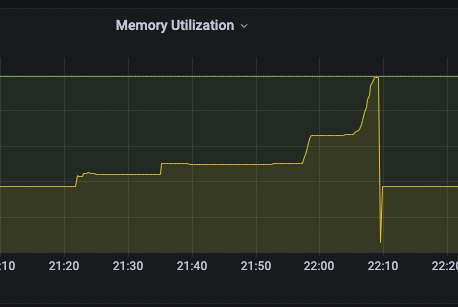I have a Phoenix LiveView application which is using a fork of WebSockex (branch is here) to listen on a websocket for data incoming and then display it on the page. My listener process occasionally becomes a zombie and does not perform any work when running in production, code located here.
Looking at the phoenix live dashboard, I was able to easily find the process which oddly always pointed at being on this line (not really sure what happened since it cannot block on this line, must have been another nearby line). The process would never change to a different line, yet reductions went up slowly (like a 3-5 every 10 seconds or so).
I should be seeing a pubsub broadcast come out of the listener every second, but the external system which broadcasts to me does so several hundred times a second (so the websocket handler should always be busy). The data I broadcast every second is a digested form of the data it receives from the websocket which is not dropped. When debugging with :dbg, :erlang.trace and :erlang.trace_pattern, I see nothing on my remote shell nor in the logs (code is deployed on fly.io, so watching there for logs in case output got redirected).
Here are some examples I tried:
iex(kart_vids@ea667b9f)18> :dbg.start()
{:ok, #PID<0.10051.0>}
iex(kart_vids@ea667b9f)19> :dbg.tracer()
{:ok, #PID<0.10051.0>}
iex(kart_vids@ea667b9f)20> :dbg.tp(WebSockex, :websocket_loop, [])
{:ok, [{:matched, :kart_vids@ea667b9f, 0}]}
iex(kart_vids@ea667b9f)21> :dbg.p(:all, :c)
{:ok, [{:matched, :kart_vids@ea667b9f, 394}]}
iex(kart_vids@ea667b9f)22> :dbg.p(:all, :c)
{:ok, [{:matched, :kart_vids@ea667b9f, 394}]}
iex(kart_vids@ea667b9f)23> :dbg.stop_clear()
:ok
iex(kart_vids@ea667b9f)24> :dbg.start()
{:ok, #PID<0.10071.0>}
iex(kart_vids@ea667b9f)25> :dbg.tracer()
{:ok, #PID<0.10071.0>}
iex(kart_vids@ea667b9f)26> :dbg.tp(WebSockex, :_, [])
{:ok, [{:matched, :kart_vids@ea667b9f, 20}]}
iex(kart_vids@ea667b9f)27> :dbg.p(:all, :c)
{:ok, [{:matched, :kart_vids@ea667b9f, 0}]}
And using Saša Jurić’s soul of elixir introspection code, didn’t produce results either (I modified it to allow for a variable number of seconds, which didn’t help):
iex(kart_vids@ea667b9f)7> defmodule KartVids.Utils.Debug do
...(kart_vids@ea667b9f)7> def trace(pid, seconds \\ 1) do
...(kart_vids@ea667b9f)7> Task.async(fn ->
...(kart_vids@ea667b9f)7> try do
...(kart_vids@ea667b9f)7> :erlang.trace(pid, true, [:call])
...(kart_vids@ea667b9f)7> rescue
...(kart_vids@ea667b9f)7> ArgumentError ->
...(kart_vids@ea667b9f)7> []
...(kart_vids@ea667b9f)7> else
...(kart_vids@ea667b9f)7> _ ->
...(kart_vids@ea667b9f)7> :erlang.trace_pattern({:_, :_, :_}, true, [:local])
...(kart_vids@ea667b9f)7> Process.send_after(self(), :stop_trace, :timer.seconds(seconds))
...(kart_vids@ea667b9f)7>
...(kart_vids@ea667b9f)7> fn ->
...(kart_vids@ea667b9f)7> receive do
...(kart_vids@ea667b9f)7> {:trace, ^pid, :call, {mod, fun, args}} -> {mod, fun, args}
...(kart_vids@ea667b9f)7> :stop_trace -> :stop_trace
...(kart_vids@ea667b9f)7> end
...(kart_vids@ea667b9f)7> end
...(kart_vids@ea667b9f)7> |> Stream.repeatedly()
...(kart_vids@ea667b9f)7> |> Stream.take(50)
...(kart_vids@ea667b9f)7> |> Enum.take_while(&(&1 != :stop_trace))
...(kart_vids@ea667b9f)7> end
...(kart_vids@ea667b9f)7> end)
...(kart_vids@ea667b9f)7> |> Task.await(:timer.seconds(seconds + 5))
...(kart_vids@ea667b9f)7> end
...(kart_vids@ea667b9f)7> end
{:module, KartVids.Utils.Debug,
<<70, 79, 82, 49, 0, 0, 11, 220, 66, 69, 65, 77, 65, 116, 85, 56, 0, 0, 1, 196,
0, 0, 0, 45, 27, 69, 108, 105, 120, 105, 114, 46, 75, 97, 114, 116, 86, 105,
100, 115, 46, 85, 116, 105, 108, 115, 46, ...>>, {:trace, 2}}
iex(kart_vids@ea667b9f)8> calls = KartVids.Utils.Debug.trace(pid(0, 5410, 0), 30)
[]
Using :erlang.trace produces some output, but it didn’t make much sense to me (p is the pid here)…
iex(kart_vids@ea667b9f)10> :erlang.trace(p, true, [:all, {:tracer, self()}])
1
iex(kart_vids@ea667b9f)11> flush
:ok
iex(kart_vids@ea667b9f)12> flush
:ok
iex(kart_vids@ea667b9f)13> flush
{:trace_ts, #PID<0.5410.0>, :in, {WebSockex, :websocket_loop, 3}, 1,
{1677, 811698, 300796}}
{:trace_ts, #PID<0.5410.0>, :out, {WebSockex, :websocket_loop, 3}, 1,
{1677, 811698, 300818}}
{:trace_ts, #PID<0.5410.0>, :in, {WebSockex, :websocket_loop, 3}, 1,
{1677, 811698, 300822}}
{:trace_ts, #PID<0.5410.0>, :out, {WebSockex, :websocket_loop, 3}, 1,
{1677, 811698, 300824}}
{:trace_ts, #PID<0.5410.0>, :in, {WebSockex, :websocket_loop, 3}, 1,
{1677, 811698, 301284}}
{:trace_ts, #PID<0.5410.0>, :out, {WebSockex, :websocket_loop, 3}, 1,
{1677, 811698, 301293}}
{:trace_ts, #PID<0.5410.0>, :in, {WebSockex, :websocket_loop, 3}, 1,
{1677, 811698, 301297}}
{:trace_ts, #PID<0.5410.0>, :out, {WebSockex, :websocket_loop, 3}, 1,
{1677, 811698, 301299}}
{:trace_ts, #PID<0.5410.0>, :in, {WebSockex, :websocket_loop, 3}, 1,
{1677, 811706, 381713}}
{:trace_ts, #PID<0.5410.0>, :out, {WebSockex, :websocket_loop, 3}, 1,
{1677, 811706, 381719}}
:ok
It wasn’t until I tried sending the process a message that it got “uncloged”:
iex(kart_vids@ea667b9f)34> p
#PID<0.5410.0>
iex(kart_vids@ea667b9f)35> send(p, {:test, "MESSAGE"})
{:test, "MESSAGE"}
iex(kart_vids@ea667b9f)36> *** ERROR: Shell process terminated! (^G to start new job) ***
Looks like the entire application rebooted because it ran OOM.
2023-03-03T03:09:09.485 app[ea667b9f] iad [info] [78407.014156] Out of memory: Killed process 520 (beam.smp) total-vm:2078356kB, anon-rss:347296kB, file-rss:0kB, shmem-rss:87280kB, UID:65534 pgtables:1088kB oom_score_adj:0
2023-03-03T03:09:09.507 app[ea667b9f] iad [info] [os_mon] cpu supervisor port (cpu_sup): Erlang has closed
2023-03-03T03:09:09.507 app[ea667b9f] iad [info] [os_mon] memory supervisor port (memsup): Erlang has closed
2023-03-03T03:09:09.617 app[ea667b9f] iad [info] Starting clean up.
2023-03-03T03:09:09.621 app[ea667b9f] iad [info] Process appears to have been OOM killed!

The shell crashing was not immediate. The timeframe where memory expansion starts to go exponential at the end, about 3-5 minutes timeframe, is about how long it took. When I looked back after trying to figure out what else to do, I noticed it had crashed.
Only thing I can think of is the websocket library got stuck on receiving data since there is no after in the receive, but the Phoenix Live Dashboard had no messages in the queue and very little memory used for that process (about 40kb). But I know, and I checked, that websocket I’m listening to was broadcasting data. Any ideas what to look at? Is there a better library for getting a GenServer like experience for listening to a websocket? (should be client side, not server side)























